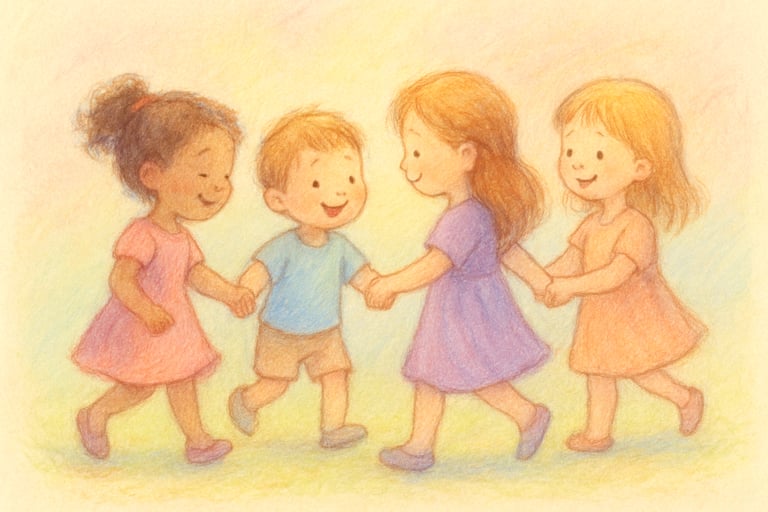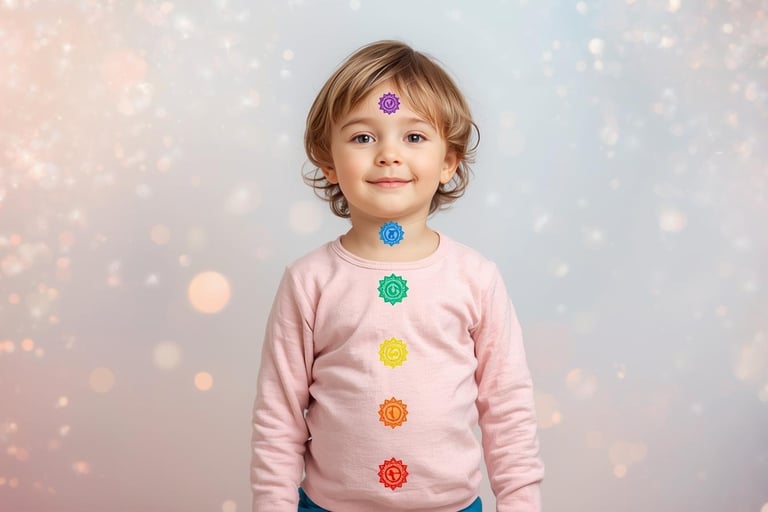Children's Wellbeing
At the heart of every child's growth is their wellbeing. True wellbeing means more than just being healthy- it is the balance of mental, emotional, physical and social needs that allow children to thrive, explore, and shine. When we nurture all of these areas together, we give children the foundation for a happy and resilient future.
↓
Let's explore what each level of wellbeing means for your child!
Mental Wellbeing
Why children's mental wellbeing matters?
Learning and Developing: A healthy mind allows children to concentrate, problem-solve, and reach their full potential.
Resilience: Children with strong mental wellbeing can navigate challenges, setbacks and changes with greater ease.
Confidence and Self-identity: Children can better manage feelings of worry, anger or sadness.
Future Health: Strong mental wellbeing in childhood reduces the risk of mental health struggles in adolescence and adulthood.
Supporting children's mental wellbeing means:
Encouraging curiosity and creativity
Offering a safe space to learn or express themselves without fear of failure or judgment
Providing consistency and routine so children feel secure
Teaching children a growth mindset- praise effort, not just results
Teaching children that mistakes are part of learning
Helping children see challenges as an opportunity to grow
Helping build healthy thought patterns- encourage gratitude, positive self-talk and reflection
Ensuring children have unstructured playtime to spark imagination
Encourage downtime to prevent overwhelm, and encourage hobbies that bring joy and confidence
Being a model of healthy mental habits - Show how you handle challenges calmly
- Share your own learning processes
- Demonstrate balance between work, rest and fun
When children feel supported, they develop a strong mental foundation that builds confidence, focus, and resilience - providing them with the tools to face life with strength, optimism and courage. With the right support, children can grow into balanced, confident adults who flourish in every area of life
Healthy minds create hopeful futures.
Children's Minds are like little sponges, always learning, questioning, and discovering. Just as children need care for their bodies, their developing minds are equally important. A healthy mind helps children learn, grow, and enjoy life to the fullest.
Emotional Wellbeing
Children experience big feelings. Learning to navigate them is part of growing up.
Why children's emotional wellbeing matters?
Healthy Relationships : Emotionally secure children can form positive, lasting connections
Confidence and Self-esteem: Children believe in themselves and embrace new challenges
Resilience: With strong emotional foundations, children can better cope with stress, change and disappointment
Learning and Growth: A calm, supported mind is ready to focus, learn and thrive at school
Long-term Health: Emotional wellbeing is linked to lower stress, better physical health, and greater happiness in adulthood.
Nurturing emotional wellbeing includes:
Helping to recognise, express and validate their emotions
Allowing all emotions to be felt and expressed - no shaming or hiding them
Encouraging kindness, empathy, and gratitude
Building self-worth through love, encouragement, and acceptance
Teaching tools for calming, self-expression and resilience
Providing a safe outlet like dancing, drawing, music or imaginative play
Building trust by listening and responding calmly
Being a role model by expressing your emotions in calm, constructive ways
Using routines and gentle transitions to reduce overwhelm
Building self-esteem by celebrating their efforts and unique qualities
Building resilience by reframing mistakes as learning opportunities
Spending quality time together
Creating family rituals that give children a sense of belonging
When children feel safe to express themselves freely, they grow into emotionally balanced, compassionate individuals. When they feel understood, valued, and supported in their emotions, they develop inner strength, empathy, and the confidence to navigate life's ups and downs.
Strong hearts nurture strong futures


Physical Wellbeing
Children thrive when their bodies are nurtured with movement, healthy habits and plenty of opportunities to play. Supporting physical wellbeing isn't just about fitness- it's about building a foundation for lifelong health, confidence and joy.
Why physical wellbeing matters?
Healthy Growth: Regular activity supports strong bones, muscles, and healthy development
Confidence and Self-esteem: Movement helps children feel capable and proud of what their bodies can do.
Focus and Learning: Physical activity improves concentration, memory, and class performance
Emotional Balance: Active play reduces stress, builds resilience, and encourages positive moods
Supporting children's physical wellbeing:
Encouraging active play such as outdoor adventures, creative movements or sport and games
Prioritise rest and sleep to help recharge their bodies and minds- create a bedtime routine
Encourage real-world play and set boundaries around screen time to help keep children moving
Be a role model- show them the value of walking, stretching, eating well and caring for your own body.
When we support children's physical wellbeing, we empower them to feel strong, energised, and ready to embrace life. Small, everyday choices - like playing together, eating colourful meals, and prioritising rest, helping build healthy habits that last a life time.
Healthy bodies help support healthy minds


By guiding children towards positive social experiences, we plant the seeds for lifelong wellbeing, resilience, and joy in connection.
Why social wellbeing matters?
Social wellbeing in early childhood lays the foundation for lifelong confidence, empathy, compassion, and resilience. By supporting their social wellbeing, children learn key social skills, such as how to share, communicate, and understand the feelings of others. Children learn the importance of teamworking, whilst helping to boost their confidence and self-esteem. These early experiences shape their ability to trust, co-operate, and create healthy relationships throughout life.
Supporting children's social wellbeing means:
Creating opportunities for play with peers
Modelling kindness and respectful communication
Celebrating empathy and acts of sharing
Encouraging group activities such as art, music and games
Children who develop strong social skills early are more likely to feel secure, adapt to challenges, and build meaningful connections throughout life. Supporting their social wellbeing today is an investment in their future happiness and success.
Every smile shared, every gentle word spoken, and every moment of play builds a child's inner world.
Social Wellbeing


Energetic Wellbeing
Here at Little Luminaries, we also support children's energetic wellbeing
Energetic wellbeing is about helping children feel calm, balanced, and at ease in themselves. All humans have an energy system with little energy centres in the body, called Chakras, that influence how we feel, think and respond to the world around us. When a child's chakras are balanced, they may feel more grounded, secure and joyful.
Just like adults, little ones can pick up on stress, emotions, and the energy of those around them. If these energy centres become unsettled as a result of those experiences, a child may feel anxious, restless, or out of balance. By supporting their energetic wellbeing through simple, gentle practices- like breathwork, mindfulness, movement and meditation- we help children release tension, restore harmony in the chakra system and help them to find their natural calm.
Research shows that simple practises can make a big difference in a child's wellbeing. These calming tools help reduce stress and anxiety, improve sleep quality, support healthy brain development, and support emotional balance. They also strengthen focus, attention, and self-control, while encouraging empathy and kindness towards others. Over time, these practices give children the resilience and confidence they need to navigate challenges with greater ease and joy.
When children feel energetically balanced, they are more confident, joyful, and ready to thrive.
For more information on our energy system, signs of imbalances, and tips to encourage balance, please get in touch for a free guide. Please also check out our Chakradance Kids wellbeing programme.




Let’s work together to nurture all levels of a child's wellbeing - Let's provide children with the tools to shine in every part of their lives


